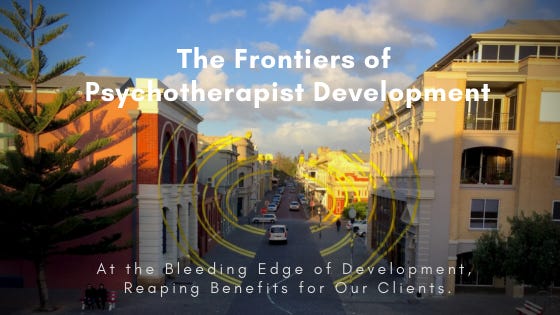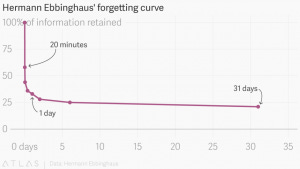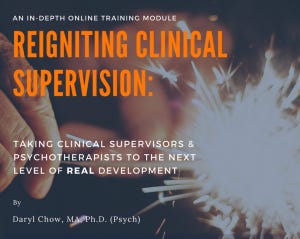The Way We Learn

Updates by Daryl Chow, MA, Ph.D.(Psych)
View this email in your browser
The Way We learn
By Daryl Chow, MA, PhD on Jan 13, 2020 04:47 pm
In today’s post, I take a moment away from the Reimagining Education in Psychotherapy (REP) series.
Given that most therapists I meet are hungry for professional development, I would like to address the topic about the way we learn as therapists.
First, try this thought experiment:
1. Recall the last day-long workshop/training/conference that you’ve attended (to be fair, make sure you are attempting to recall one that was a positive experience);
2. Next, put on a timer for 60secs, brain-dump all that you can recall on a piece of paper based on what you’ve learned, and
3. Finally, in terms of percentage, how much do you think you recalled from this training?
(If you have notes from the training that you were recalling, check it now.)
I would place my bet that not only would the percentage you rate yourself would not be 100%, but if you were given a chance to re-play the training or even review your notes of the event, you would pick out stuff that you might have missed.
This is because of a phenomenon dating back more than a 100 years ago by the German psychologist Hermann Ebbinghaus. He called this the forgetting curve.
Memory is the mother of all wisdom.
Aeschylus
Turns out that forgetting, is actually good for learning. When we are able to actively retrieve what we have forgotten, our learning deepens. (more on this in the Deep Learner course. See below)
Workshops vs. Web Learning
I know many practitioners are resistant to online training platforms. I know I was. Even though I would consider myself tech savvy, my experience of several online workshops were frankly, a poor substitute of live workshops. In such situations, live trainings were conducted and recorded, the material was then repurposed and sold for an online course.
Other times, it was a recording of a live webinar where the trainer was speaking to a bunch of students, and again, the material was repurposed for an online training, leaving minimal or no possibility of asking questions or interaction with others.
Not all online trainings I’ve tried were bad though. Through experimentations and trying to learn from others who were optimising online platforms to increase the depths of learning for individuals, I discovered that it is actually possible to design a learning platform with the primary intention of teaching the material online, without overwhelming an individual, and weaving in time for reflection, discussion, asking questions and literally applying the new ideas in their lives.
Here’s the key difference that I see between real-time training and online learning:
Real-time training/workshop is like a river.
It is a constantly flowing torrent of ideas. If the learner steps out of the river for a few minutes, or needs some time to think, he is now behind. The learner may be able to ask questions, but needs to constantly try and catch up and not fall behind. A chance for a revisit of the content after some time of reflection is not possible, with only the notes or slides that you’ve captured.Online learning, on the other hand, is like a lake.
The learner can step in and out of the water at her own time, and pace herself as she moves along; the water reminds the same. This stillness allows for pausing, revisiting the material, reflecting, and connecting with past knowledge. Online learning at its best allows for the learner to ask questions, revisit the materials, and for the person to master a particular difficult segment before moving on.
Designed for Deep Learning
Deep learning requires the ability to capture, retrieve and connect with prior knowledge. This reflective process helps counter the forgetting curve. The trouble with attending a typical workshop that does not account for the forgetting curve is that it creates a high dose of inspiration, and a great deal of lost ideas. A well-designed workshop must allow space for the learner to capture not only notes, but to create their emotional responses to each section, and crucially, not just “collect dots” but “connect the dots” of the web of new knowledge and their prior understanding.
This is why I have been grafting the best of what I’ve discovered from the learning sciences and created what I call web-based workshops. It’s not just content. It’s also community. It’s not just a flood of ideas, but it’s carefully designed to stream in one idea at a time i.e., a drip-based system, so that these ideas can mingle and interconnect with your existing wisdom. Arguably, the most consistent feedback I get from participants around the world is that they loved the drip-based approach to learning, which counteracts feeling overwhelmed.
These web-based workshops are designed specifically to be a at the intersection between time-specific and asynchronous. For example, in the Reigniting Clinical Supervision web-based workshop, you get 1 practical idea every Monday and Friday for about 6 months, but, you can always revisit the materials (videos, transcripts, key summaries, discussions) at any point in time. Because this is also not subscription based, you’d get a LIFE-TIME access, plus any updates I make along the way.
The Downside of Online Learning
Clearly there are downsides to online learning compared to face-to-face real-time training. Most typical online learning platforms assumes a highly motivated individual who is not only a self-directed learner, but also one who will self-manage their time and self-synthesis the learnings.
Perhaps a better model for learning is one that guides the learner, who remains independent, but integrated in a community each step of the way—and instead of dumping a whole chunk of information to the learner, using distributed practice to it’s fullest advantage—might be a better way to go. Distributed or spacing out the materials affords the learned to mingle the new ideas with real-world situations, come back to the lake of information, and dip their toes back in again. A much better way to to translate what you’ve learned into the real-world.
The Reigniting Clinical Supervision Web-Based Workshop
To date, more than a 100 therapists, supervisors and thought leaders around the world have gone through the Reigniting Clinical Supervision (RCS) web-based workshop. (Read what they have to say)
The DOORS ARE NOW OPEN for the 8th Batch of this in-depth course. If you are on the Frontiers list, check out our newsletter for the wicked discount promo code. If you miss them, drop me a note.
We kick-off on 20th of January, 2020.
Oh, and by the way, you need not be tech-savvy at all to navigate this course. If you know how to browse a website (which got you here anyway), chances are it is a non-issue benefiting from this course. Still unsure? Take this for a test-drive. Preview some of the modules. We also have a money-back guarantee with the Reigniting Clinical Supervision course. This is not meant to be gimmicky. I want you to feel how low the level of “risk” is actually involved.
p/s: We have a newly minted course called Deep Learner: A Psychotherapist’s Field Guide to Extend Your Mind and Harness Wisdom into Clinical Practice. If you are interested to be invited, drop me an email (info@darylchow.com) so that we can put you on the waitlist. We are aiming to kick this off around Feb-Mar 2020.
The post The Way We learn appeared first on Frontiers of Psychotherapist Development.
For Best Experience, Read in browser »


Recent Articles:
The Clock of Learning Across Disciplines (CLAD, Part I of II)
Lego for Psychotherapists
Measure Growth, Not Competence
Teach the 3 Types of Knowledge and Not Just 1
Kindling the Flame





